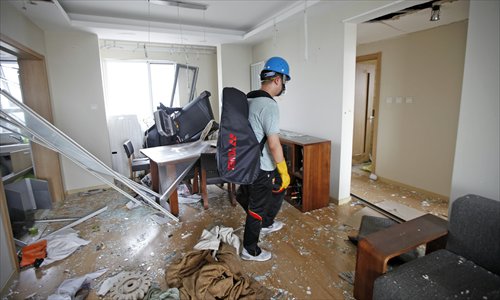Tianjin residents struggle to return to normality after disaster

A Binhai resident surveys the damage done to his home by the blasts on August 18. Photo: CFP
Any shell-shocked residents of Tianjin looking to ease their stress with a day of sport or dancing will have to look outside the city after some events were canceled as a result of the warehouse blasts.
Organizers of Tianjin's Pacific Links China Championship announced on August 25 that they have canceled the tournament out of respect for the grieving community even though the golf club was not directly damaged by the blasts.
The Champions Tour was scheduled to be held from September 18 to 27 at the city's 27 Club and according to the Pacific Links China Championship's official Sina Weibo, it was projected to make a profit of more than 3 million yuan ($468,600).
The team behind the Irish tap dancing show Heartbeat of Home also canceled their show in Tianjin, which was meant to be held in Tianjin Grand Theater from August 27 to 30, and will put on no performances in Tianjin in their tour of China.
But these cancelations are just the tip of the iceberg of what Tianjin residents are dealing with in the aftermath of the tragedy, which has caused reportedly more than $1 billion in damage.
The new school semester will begin in early September, but Zhang Wei (pseudonym), a 53-year-old teacher at a middle school in the city's Binhai district, will not be teaching children this autumn.
The deadly blasts in the port city on August 12 not only shattered furniture and windows in Zhang's apartment, but also turned his normal life upside down, leaving him with mental trauma that makes him unable to work.
"My heart pounds every time I hear a loud sound and the last thing I want to do is to recall that night," said Zhang, adding that his life has totally changed since he ran out of his house in Haigangcheng community which is 600 meters away from the blast site.
Also, he is busy seeking adequate compensation for his losses from the parties responsible.
According to the Xinhua News Agency, 17,000 households, 1,700 enterprises and 675 commercial stores were affected by the blasts that have taken at least 145 lives, with 28 still missing.
But the influence of the blasts on Binhai and Tianjin as a whole has been more than just statistics.
Influence on property market
It cost Zhang more than 1 million yuan to buy his apartment in Haigangcheng and the fact that the property prices will decrease sharply bothers him and other residents.
"Who will buy or rent houses near the blast area considering the influence of hazardous chemicals," another resident of Haigangcheng, surnamed Huang, told the Global Times.
Statistics posted on a property website, fang.com, showed that the number of property transactions in Binhai district decreased by 36.67 percent from August 10 to 16 compared to the same period last year.
Zhang Dawei, marketing executive of Central Property, a real estate firm, was quoted as saying that the losses of real estate developers in Binhai might be more than 1 billion yuan by news portal 21ccom.net.
Damage to Tianjin port
The blasts have had a great influence on Tianjin port, which is the fourth-biggest in the world and a key gateway to North China for importing goods, especially cars and oil.
According to statistics released by the port authority, the volume of cargo traded through the port in 2014 was 540 million tons and 14 million containers.
"Economic activity in Tianjin has yet to return to normal several days after the devastating explosions there," Capital Economics, a research firm, said in a note to clients.
"While most of the port has remained in operation, damage to warehousing and factory facilities has been severe," it said, adding that "disruption is likely to spread along supply chains."
The power supply to Tianjin Five Continents International Container Terminal, which is 8 kilometers from the blast area, was damaged during the blast but operations returned to normal on August 13, Zhang Peng, an employee from the company said in an interview with the media, including the Global Times.
The daily container volume traded through the port dropped by a few thousand compared to an average of 14,000 in the days before the blast and the traffic capacity of the company has been affected by the following rescue work, said Zhang.
Newspaper headline: Back to life